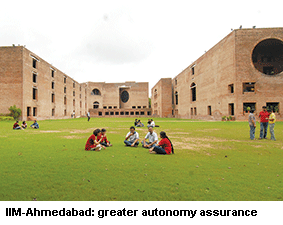Delhi: Reworked IIM Bill, 2015
 The Indian institute of Management (IIM) Bill, 2015, which created a furore because it severely circumscribed the autonomy of the country’s 20 IIMs (see EW cover story August 2015 on www.educationworld.in archives) and was subsequently cold storaged, is being readied in a new variant and will be presented to the Union cabinet shortly.
The Indian institute of Management (IIM) Bill, 2015, which created a furore because it severely circumscribed the autonomy of the country’s 20 IIMs (see EW cover story August 2015 on www.educationworld.in archives) and was subsequently cold storaged, is being readied in a new variant and will be presented to the Union cabinet shortly.
The new Bill has reportedly been reworked after dropping several controversial clauses and is being vetted by the law ministry before it is presented to the Union cabinet prior to being tabled in the winter session of Parliament. Chairing his first IIM Coordination Committee meeting at IIM-Shillong on September 20, Union human resource development (HRD) minister Prakash Javadekar assured IIM directors that the new Bill, which will give them greater autonomy, will soon receive cabinet approval.
Although they are highly ranked and acclaimed globally for producing corporate and business leaders for Indian and foreign companies, the IIMs, whose number has risen to 20 after a new IIM-Jammu was announced on October 13, don’t have statutory power to confer degrees or Ph Ds. Instead, they award institutional diplomas and fellowships to their graduates. Primarily to invest them with degree granting power, former HRD minister Smriti Irani drafted the IIM Bill, 2015. However, when the draft Bill was made public, it generated a national outcry because it severely abridged the autonomy of the IIMs, including the globally respected ABC (Ahmedabad, Bangalore and Calcutta) institutes, whose graduates are snapped up by the world’s top-rated corporates.
For instance, the Bill proposed that of the 15 members of each institute’s board of governors, the Union government would nominate seven, directly or indirectly. Moreover, the chairperson would be appointed by the HRD ministry as would the directors of all IIMs. Indeed under Irani’s Bill, all decisions taken by the board of governors relating to the appointment of committee chairpersons and faculty members, prescribing tuition fees and faculty remuneration and introducing curriculum changes would require the HRD ministry’s approval.
Understandably, the bull-in-a-china shop provisions of the IIM Bill, 2015, which was cold storaged by the Narendra Modi-led BJP/NDA government following national outrage, was a major factor in Irani’s ouster from the HRD ministry in July this year. Subsequently, since Javadekar took charge of the HRD ministry four months ago, the Bill has been reworked to inter alia completely abolish the office of Visitor (President of India) of the IIMs, and also reduce the number of government nominated members on their board of governors.
“If what we hear about the new IIM Bill is true, it will be a positive step of the BJP/NDA government. The earlier Bill was strange because it advised gurus how to run gurukuls. Government should repose trust in institutional managements, particularly the IIMs which have won themselves global reputations. If government is serious about improving business management education in India, it should close down the new IIMs it has created and build an ecosystem as in the US where both public and private institutions flourish,” advises Dr. Kamaljit Singh Anand, director of the Institute of Management Studies, Noida (estb. 1998) and a distinguished IIM-Ahmedabad fellow.
But that is asking too much of the BJP, which with its absolute majority in the Lok Sabha, is beginning to enjoy the power and perquisites of control-and-command governance.
Autar Nehru (Delhi)
















Add comment